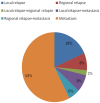Survival and Toxicities of IMRT Based on the RTOG Protocols in Patients with Nasopharyngeal Carcinoma from the Endemic Regions of China
- PMID: 29151959
- PMCID: PMC5688925
- DOI: 10.7150/jca.20351
Survival and Toxicities of IMRT Based on the RTOG Protocols in Patients with Nasopharyngeal Carcinoma from the Endemic Regions of China
Abstract
Background: This study evaluated the survival outcomes and toxicities of intensity-modulated radiation therapy (IMRT) based on the RTOG 0225/0615 RT protocols in patients with nasopharyngeal carcinoma (NPC) from a region of China where this tumor type is endemic. Methods: A total of 455 patients with non-metastatic, histologically-confirmed NPC were retrospectively reviewed. All patients were treated by IMRT using the RTOG 0225/0615 RT protocols; 91.1% (288/316) of patients with stage III-IVb NPC received concurrent chemotherapy +/- induction chemotherapy or adjuvant chemotherapy. Results: Estimated four-year overall survival (OS), failure free survival (FFS), local relapse free survival (LRFS), regional relapse free survival (RRFS) and distant metastasis free survival (DMFS) were 83.8%, 80.5%, 94.3%, 96.7% and 85.8%, respectively. T and N category were significant prognostic factors for OS, FFS, RRFS and DMFS; and T category, for LRFS. In-field failure was the major loco-regional failure pattern. During RT, 206 (45.3%) patients experienced acute grade 3-4 toxicities. The most common acute toxicity was mucositis; 124 (27.2%) patients experienced grade 3-4 mucositis; 46 (10.1%) experienced serious late toxicities. The most common late toxicity was MRI-detected radiation-induced temporal lobe necrosis (6.8%). Conclusions: The RTOG IMRT protocols are feasible for patients with NPC from the endemic regions of China.
Keywords: Nasopharyngeal carcinoma; RTOG 0225; RTOG 0615.; intensity-modulated radiotherapy.
Conflict of interest statement
Competing Interests: The authors have declared that no competing interest exists.
Figures



References
-
- Cancer incidence in five continents. Volume VIII. IARC Sci Publ; 2002. pp. 1–781. - PubMed
-
- Chen Y, Sun Y, Liang SB. et al. Progress report of a randomized trial comparing long-term survival and late toxicity of concurrent chemoradiotherapy with adjuvant chemotherapy versus radiotherapy alone in patients with stage III to IVB nasopharyngeal carcinoma from endemic regions of China. Cancer. 2013;119:2230–8. - PubMed
-
- Al-Sarraf M, LeBlanc M, Giri PG. et al. Chemoradiotherapy versus radiotherapy in patients with advanced nasopharyngeal cancer: phase III randomized Intergroup study 0099. J Clin Oncol. 1998;16:1310–7. - PubMed
-
- Langendijk JA, Leemans CR, Buter J, Berkhof J, Slotman BJ. The additional value of chemotherapy to radiotherapy in locally advanced nasopharyngeal carcinoma: a meta-analysis of the published literature. J Clin Oncol. 2004;22:4604–12. - PubMed
LinkOut - more resources
Full Text Sources
Other Literature Sources

